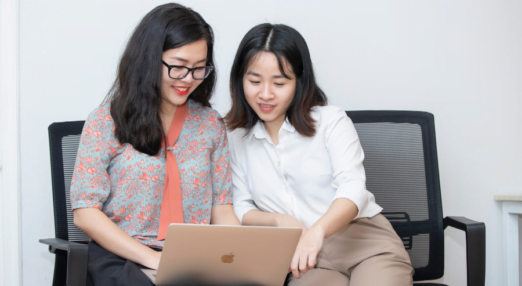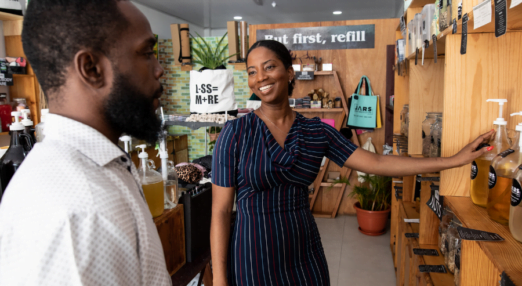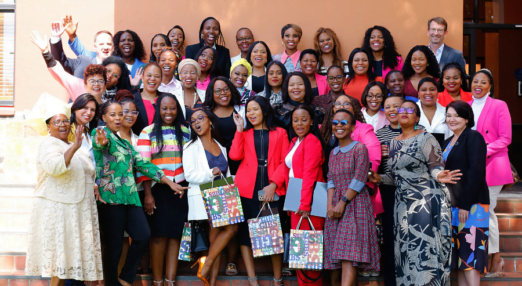Women-owned businesses power up Guyana’s economy
With partners, we recently convened a panel discussion led by key actors in Guyana’s women’s entrepreneurship ecosystem.

On a recent visit to Guyana, members of the Foundation’s staff joined our Founder, Cherie Blair CBE KC, and our partners and allies for a panel discussion led by key actors in Guyana’s women’s entrepreneurship ecosystem who are boosting women’s economic equality in the country. Our Senior Programme Manager, Leanne Baker, shares an overview.
“Visiting Guyana is always a joy, and the people there are a huge part of that. We work with so many incredible women entrepreneurs and partners in the country, who have contributed to its massive growth both economically and in gender equality over the past few years. Meeting them in person always leaves me feeling energised and builds my understanding of Guyana’s entrepreneurial landscape.
I was pleased to share this experience with some of my colleagues, as well as our Founder, Cherie Blair CBE KC, and other notable guests during a recent trip to Georgetown, Guyana. While there, we had the privilege of touring businesses owned by women entrepreneurs.

We also convened a panel of expert women who are leading the way in women’s economic justice, in partnership with the ExxonMobil Foundation. Moderating the panel was the first female Vice President of the University of Guyana, Professor Paloma Martin Mohammed. Panellists included:
- Cherie Blair CBE KC, Founder of Cherie Blair Foundation for Women
- Dr. Vindhya Persuad, Minister of Human Services and Social Security
- Nicola Balram, Communications Manager from the Centre of Local Business Development
- Camille Deokie, Founder and CEO of Camille’s Academy, a user of our HerVenture app and alumna of our Road to Growth training programme
In attendance were women from our programmes as well as the Centre’s AccelerateHer programme, ExxonMobil Foundation’s Global Women in Management programme and the Ministry’s Women’s Innovation and Investment Network (WIIN). We also invited representatives from key stakeholders in the economic ecosystem, such as financial institutions.
It felt like an important moment to be discussing women’s economic justice, as Guyana is currently experiencing enormous economic growth.
It felt like an important moment to be discussing women’s economic justice, as Guyana is currently experiencing enormous economic growth. We know that while this is hugely positive, it is also vital to ensure women’s inclusion in the newly arising economic opportunities. As such, we wanted to hear from our panellists on how to leverage this rapid economic growth to empower and upskill women entrepreneurs.
To start us off, the Minister responded to the question of what the economic growth of the past few years has done for women’s economic empowerment in Guyana. She highlighted the expansion of ecosystems relating to entrepreneurship, employability, ownership of land and other assets, to ensure women are not only engaged but feel a sense of empowerment.
She also affirmed the government’s commitment to gender equality. Guyana jumped from 105 to 57 in the World Economic Forum’s Global Gender Gap Index on economic opportunity between 2021 to 2022. For her ministry – Human Services – this is particularly important. She launched the Women’s Innovation and Investment Network (WIIN) to provide training opportunities to enable women to enter the labour market or start businesses.
Nicola Balram from the Centre for Local Business Development added to her sentiment, that increased economic activity means increased opportunity for business, and women can take advantage of this. In the Centre’s programme, AccelerateHer, they have seen that women often start businesses due to a need or a passion but that they need training on the operational side so that they can seize the opportunities available.
Professor Mohammed then asked Cherie to speak to the importance of partnership and cross-sector collaboration in ensuring women can capitalise on economic growth. Cherie spoke to the success of our partnerships in Guyana; 1 in 25 Guyanese women now use our HerVenture app, due to the collaboration between our delivery partners ActionINVEST Caribbean Inc, the government, and local telecoms provider GTT. This partnership has enabled us to reach women in every region of Guyana and to become a trusted brand, as well as to launch a learning track focused on mobile money and how Guyanese women can use this to benefit their business.

We then heard from Camille Deokie, who spoke from her experience as a women entrepreneur and as a Road to Growth alumna. She described how being part of the panel was a win for her, because confidence was always the thing that kept her from achieving her goals. But having a sisterhood through the programme enabled her to build her confidence and encouraged her to take advantage of opportunities. She also spoke passionately about women claiming their space to be part of decision making and to contribute innovation and a new type of leadership, centred on compassion.
The Minister shared more about the Guyanese government’s priorities in terms of empowering women and ensuring they can take their rightful place during this economic boom. She highlighted that they are working towards a National Gender Equality and Inclusion Policy, so that women have a clear understanding of how they can take up space. She then took us through how the government is ensuring women can take up opportunities for training and employment– including day and night care facilities, responses to gender based violence, microgrants, and opportunities to work and learn from home through technology.
Cherie agreed on the importance of access to technology, citing research that shows women do not get equal access to technology currently. In this area, partnerships between the government and private sector are vital to spread access to technology around the country. She then spoke on the importance of ensuring business training is tailored to women – they have to be seen in their wider context and have their specific perspectives and needs addressed.
She identified the disparity in accessing finance – not just to start businesses but to grow them. This is something women entrepreneurs from around the world are consistently telling us is a key challenge for them.
Camille then spoke further about the specific challenges that women are facing in Guyana. She identified the disparity in accessing finance – not just to start businesses but to grow them. This is something women entrepreneurs from around the world are consistently telling us is a key challenge for them. She also spoke about the need for a cultural shift, to change how we see women who are dominating, or who are taking up male dominated role. She gave the example of young girls in her schools who are eager to pursue something such as working with heavy duty machinery but are discouraged by their parents and become demotivated from pursuing their goals.

Professor Mohamed asked Nicola what she thinks we can do to make sure women become more visible as leaders. She identified the need to build women’s confidence and to provide opportunities for mentorship. Through trainings such as Road to Growth, AcclerateHer and WIIN, we can show women that through taking on learning and increasing their knowledge base, they can be leaders in their communities.
In the final moments of the panel, the key takeaways were summed up perfectly. In Guyana, the government is committed to ensuring that women are able to take their place in the economic boom. There are many opportunities out there for women and we recognise the need to collaborate and to tailor these opportunities to women’s unique needs.
We must all believe in the power of women to not simply improve their own lives but to have a ripple effect in their families, communities and society. We encourage leaders to continue to take a chance on women, because as Professor Mohamed closed the event with ‘society is a bird with two wings, we need both to fly’.”
We must all believe in the power of women to not simply improve their own lives but to have a ripple effect in their families, communities and society.
Read more news...
-

The knowledge ripple effect
Women entrepreneurs don't keep knowledge to themselves, they share it. This creates a massive ripple effect of impact.
Read more
-

Women’s MSMEs boost economies and promote sustainability
Our CEO, Dhivya O'Connor, shares why women's Micro, Small, and Medium-sized Enterprises (MSMEs) are crucial for global prosperity.
Read more
-

We’re supporting 45,000 women across Sub-Saharan Africa with DHL Express
Through our renewed multi-year partnership with DHL Express, we'll expand our reach and deepen our impact.
Read more
